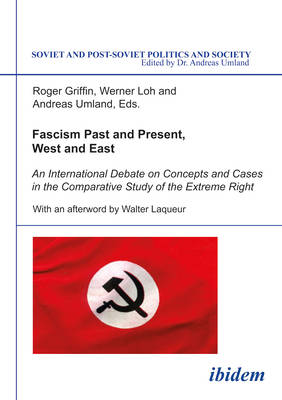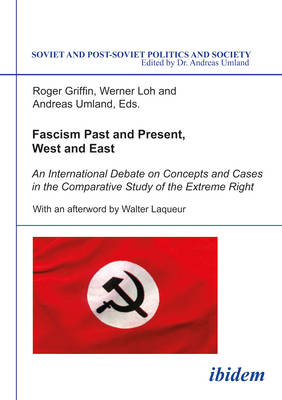
Bedankt voor het vertrouwen het afgelopen jaar! Om jou te bedanken bieden we GRATIS verzending (in België) aan op alles gedurende de hele maand januari.
- Afhalen na 1 uur in een winkel met voorraad
- In januari gratis thuislevering in België
- Ruim aanbod met 7 miljoen producten
Bedankt voor het vertrouwen het afgelopen jaar! Om jou te bedanken bieden we GRATIS verzending (in België) aan op alles gedurende de hele maand januari.
- Afhalen na 1 uur in een winkel met voorraad
- In januari gratis thuislevering in België
- Ruim aanbod met 7 miljoen producten
Zoeken
Fascism Past and Present, West and East
An International Debate on Concepts and Cases in the Comparative Study of the Extreme Right
Roger Griffin, Werner Loh, Andreas Umland
€ 78,45
+ 156 punten
Omschrijving
In the opinion of some historians the era of fascism ended with the deaths of Mussolini and Hitler. Yet the debate about its nature as a historical phenomenon and its value as a term of historical analysis continues to rage with ever greater intensity, each major attempt to resolve it producing different patterns of support, dissent, and even hostility, from academic colleagues. Nevertheless, a number of developments since 1945 not only complicate the methodological and definitional issues even further, but make it ever more desirable that politicians, journalists, lawyers, and the general public can turn to "experts" for a heuristically useful and broadly consensual definition of the term. These developments include: the emergence of a highly prolific European New Right, the rise of radical right populist parties, the flourishing of ultra-nationalist movements in the former Soviet empire, the radicalization of some currents of Islam and Hinduism into potent political forces, and the upsurge of religious terrorism. Most monographs and articles attempting to establish what is meant by fascism are written from a unilateral authoritative perspective, and the intense academic controversy the term provokes has to be gleaned from reviews and conference discussions. The uniqueness of this book is that it provides exceptional insights into the cut-and-thrust of the controversy as it unfolds on numerous fronts simultaneously, clarifying salient points of difference and moving towards some degree of consensus. Twenty-nine established academics were invited to engage with an article by Roger Griffin, one of the most influential theorists in the study of generic fascism in the Anglophone world. The resulting debate progressed through two 'rounds' of critique and reply, forming a fascinating patchwork of consensus and sometimes heated disagreement. In a spin-off from the original discussion of Griffin's concept of fascism, a second exchange documented here focuses on the issue of fascist ideology in contemporary Russia. This collection is essential reading for all those who realize the need to provide the term 'fascism' with theoretical rigor, analytical precision, and empirical content despite the complex issues it raises, and for any specialist who wants to participate in fascist studies within an international forum of expertise. The book will change the way in which historians and political scientists think about fascism, and make the debate about the threat it poses to infant democracies like Russia more incisive not just for academics, but for politicians, journalists, and the wider public.
Specificaties
Betrokkenen
- Auteur(s):
- Uitgeverij:
Inhoud
- Aantal bladzijden:
- 520
- Taal:
- Engels
- Reeks:
- Reeksnummer:
- nr. 35
Eigenschappen
- Productcode (EAN):
- 9783898216746
- Verschijningsdatum:
- 27/04/2006
- Uitvoering:
- Paperback
- Formaat:
- Trade paperback (VS)
- Afmetingen:
- 148 mm x 210 mm
- Gewicht:
- 616 g

Alleen bij Standaard Boekhandel
+ 156 punten op je klantenkaart van Standaard Boekhandel
Beoordelingen
We publiceren alleen reviews die voldoen aan de voorwaarden voor reviews. Bekijk onze voorwaarden voor reviews.









